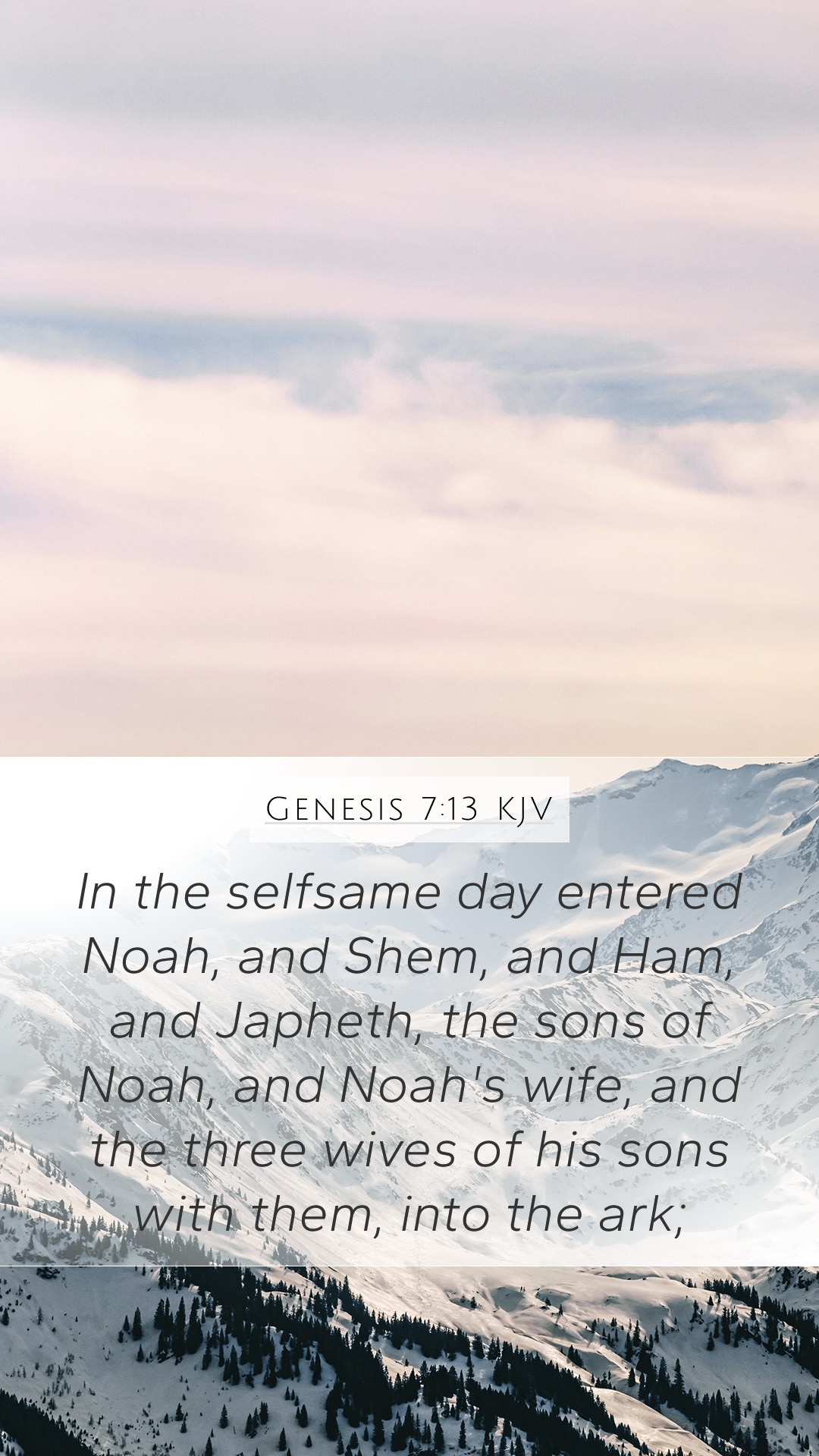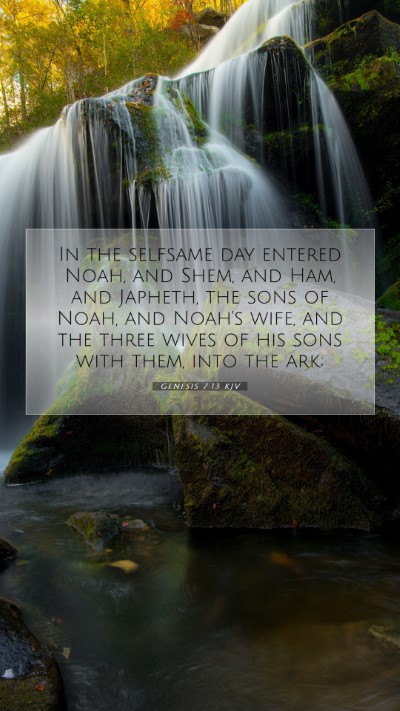Understanding Genesis 7:13
Genesis 7:13 is a pivotal verse within the narrative of Noah’s flood, which elucidates God's judgement upon a sinful world and highlights Noah's obedience in a time of great moral decline. Below, we explore the meanings, interpretations, and insights drawn from esteemed public domain commentaries by Matthew Henry, Albert Barnes, and Adam Clarke.
Bible Verse Commentary
"In the selfsame day entered Noah, and Shem, and Ham, and Japheth, the sons of Noah, and Noah’s wife, and his sons’ wives with them, into the ark." (Genesis 7:13)
Overview of the Verse
This verse details the critical moment when Noah, his family, and the animals were gathered into the ark before the impending flood. The imagery here signifies both a literal and metaphorical entrance into safety and divine protection.
Matthew Henry's Commentary
Henry emphasizes the importance of timing in God’s plan. The phrase "selfsame day" denotes God's precise control over events. It illustrates that the ark was a refuge prepared by God for Noah and his family, signifying their righteousness amid a wicked generation. The entry into the ark represents the separation between the saved and the perishing, a theme that resonates throughout Scripture.
Albert Barnes' Commentary
Barnes stresses that the inclusion of Noah's immediate family in the ark underscores the value of familial faith. The presence of Noah’s wife and sons’ wives illustrates God's mercy extended to more than just the righteous individual, encapsulating a wider relationship with family and community. This act of entering the ark is seen as a symbol of God’s covenant with Noah to preserve life, reflecting His grace amidst judgment.
Adam Clarke's Commentary
Clarke draws attention to the faith exhibited by Noah and his family. Their compliance in entering the ark serves as a model for faith and obedience. Clarke also analyzes the significance of the number eight — Noah, his wife, their three sons, and their wives — symbolizing a new beginning for humanity post-flood. The family’s unity in obeying God's command highlights the importance of collective faith and obedience to divine instructions.
Key Insights from Genesis 7:13
- The Sovereignty of God: The timing of the entry into the ark reflects God’s sovereign orchestration of history.
- The Importance of Righteousness: The preservation of Noah and his family emphasizes the value of living a life in accordance with God’s will.
- Symbolism of the Ark: The ark serves as a symbol of God’s salvation and refuge amid chaos and destruction.
- God's Mercy: The selection of Noah’s entire family points to God's desire for salvation to extend beyond the individual to a collective group.
- Faith in Action: Noah's obedience to God's command exemplifies active faith, encouraging believers to trust and follow divine guidance.
Cross References
- Hebrews 11:7: This verse commends Noah for his faith in building the ark.
- Matthew 24:38-39: Jesus draws parallels between the days of Noah and the end times, emphasizing unawareness of impending judgment.
- 2 Peter 2:5: Noah is referred to as a preacher of righteousness amidst a corrupt generation.
Conclusion
Genesis 7:13 serves as a profound reminder of God's justice and mercy. Through various interpretations from esteemed commentators, we gain a deeper understanding of the importance of righteousness, faith, and the familial bonds that are essential in responding to God's calling. As we explore this verse and its meanings, we encourage further Bible study insights and scripture analysis to delve deeper into the significance of this pivotal moment in biblical history.
This insight into Genesis 7:13 is intended for anyone seeking to enrich their Bible verse understanding and engage in effective online Bible study. By examining such verses, believers can find direction and encouragement for applying biblical principles in their daily lives.
Additional Study Topics
- Understanding Difficult Bible Passages
- In-Depth Bible Verse Analysis
- Historical Context of Bible Verses


